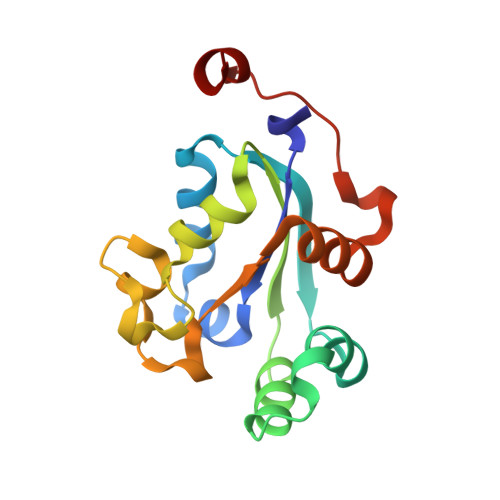An exonuclease-resistant chain-terminating nucleotide analogue targeting the SARS-CoV-2 replicase complex.
Shannon, A., Chazot, A., Feracci, M., Falcou, C., Fattorini, V., Selisko, B., Good, S., Moussa, A., Sommadossi, J.P., Ferron, F., Alvarez, K., Canard, B.(2024) Nucleic Acids Res 52: 1325-1340
- PubMed: 38096103
- DOI: https://doi.org/10.1093/nar/gkad1194
- Primary Citation of Related Structures:
8PYW - PubMed Abstract:
Nucleotide analogues (NA) are currently employed for treatment of several viral diseases, including COVID-19. NA prodrugs are intracellularly activated to the 5'-triphosphate form. They are incorporated into the viral RNA by the viral polymerase (SARS-CoV-2 nsp12), terminating or corrupting RNA synthesis. For Coronaviruses, natural resistance to NAs is provided by a viral 3'-to-5' exonuclease heterodimer nsp14/nsp10, which can remove terminal analogues. Here, we show that the replacement of the α-phosphate of Bemnifosbuvir 5'-triphosphate form (AT-9010) by an α-thiophosphate renders it resistant to excision. The resulting α-thiotriphosphate, AT-9052, exists as two epimers (RP/SP). Through co-crystallization and activity assays, we show that the Sp isomer is preferentially used as a substrate by nucleotide diphosphate kinase (NDPK), and by SARS-CoV-2 nsp12, where its incorporation causes immediate chain-termination. The same -Sp isomer, once incorporated by nsp12, is also totally resistant to the excision by nsp10/nsp14 complex. However, unlike AT-9010, AT-9052-RP/SP no longer inhibits the N-terminal nucleotidylation domain of nsp12. We conclude that AT-9052-Sp exhibits a unique mechanism of action against SARS-CoV-2. Moreover, the thio modification provides a general approach to rescue existing NAs whose activity is hampered by coronavirus proofreading capacity.
- AFMB, CNRS, Aix-Marseille University, UMR 7257, Case 925, 163 Avenue de Luminy, 13288, Marseille Cedex 09, France.
Organizational Affiliation:


















